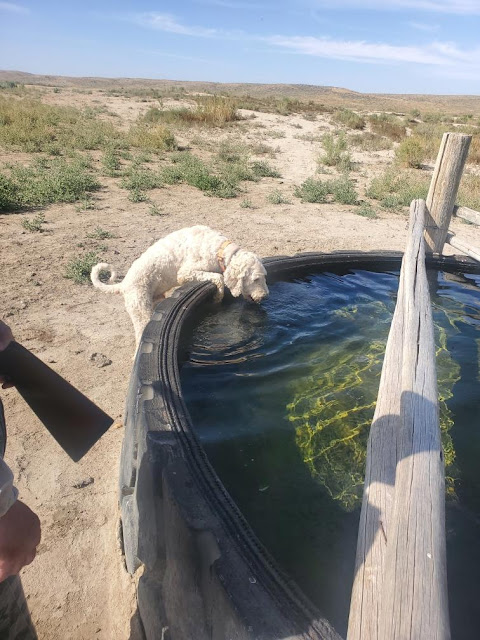Accept the things to which fate binds you, and love the people with whom fate brings you together,but do so with all your heart.
Marcus Aurelius, Meditations
Longhorn in mixed herd, central Wyoming. This is from this year. . . a high water year.
From the r/ranching Subreddit on, of course, Reddit:
I just inherited 1200 acres of ranch land. WTF do I do?
My father in law wants to pass on his ranch to me before he passes. He’s in bad health and for some reason decided that I would be the best of everyone to take on his property. I don’t know a god damn thing about cows or hay, having lived in a big city my whole life; but I’m a pretty good mechanic and would fix all of his equipment whenever I visited him, so I guess he likes me and he thinks I’m the best to take things over. The ranch, located in southern Wyoming, hasn’t done anything productive in the past 5 years due to FIL declining health and I have no idea what to do with it. Like the title says, it’s 1200 acres of mostly hilly sagebrush with grassy bottom land surrounded by forest land. I promised him I wouldn’t break up the land or develop it; but how does a city slicker move out to the middle of Wyoming and generate a living income off of the land without knowing a thing about ranching? Can I lease the grazing property out; lease the grass land out? Just looking for any advice or recommendations. Any advice is appreciated.
Let's answer the question first, that being, "how does a city slicker move out to the middle of Wyoming and generate a living income off of the land without knowing a thing about ranching?"
The answer is simple. You don't.
Here's the reason why:
Replies, from me, and some other guy.
Now, the same thread is full of advice on how this person can just move out and, yee haw, be a rancher.
Bull.
All agriculture is local. All of it. A grain farmer in Kansas can't walk right into a bandanna plantation in Africa and expect to make a go of it instantly. Gardeners all over the country, if they suddenly inherited a wheat farm, would go broke.
And with animal agriculture, this is particularly true. Ranching in Wyoming may be like ranching in Montana, but it's not like cattle farming in Arkansas. Frankly, a Northern Plains rancher used to low grass and cold winters would have a lot better chance of being successful in Arkansas, than an Arkansas cattle farmer would of being a rancher here.
And somebody from a city, stepping into land on advice from people who don't realize that 1,200 acres doesn't cut it here as a ranch, and who have never endured our winters.
Forget it.
This property will be leased to a neighbor, or sold.
And let us discuss the injustice of things.
From when I was small, I've always wanted to ranch. It's hard to explain these things, but I always wanted to. It's probably one of the two "I want to be when I grow up" things in my personality. The other one was being a soldier, which I've done. Regarding that, by the time I was approaching graduating from high school (I graduated when I was 17 years old, not all that uncommon at the time) that was waning, but that desire was expressed by six years I spent in the National Guard.
And I have been a stockman as an adult, but I was never able to make it my full time occupation.
I came pretty close twice, once before being married, and once after, but events transpired and. . . off to the office I go.
There's a difference between being in the Regular Army (which I was for training) and being in the reserves. And there's a difference between being a part-time stockman and a full time one. Moreover, as I'm in one of the professions, I've entered that weird part of my life, which seems to be the case for at least people in my profession, when the kids have grown up and have their own lives, and your spouse has her own job, and most of the people you meet on a daily basis are in your profession, where your private aspirations just die as other people murder them.
You don't need a stock working horse. . . you can borrow one. Wouldn't you like to sell that old one ton stick shift and buy a nice 1/2 ton sport auto, or maybe a Jeep pickup? You don't need to work cattle this weekend, you can get that big project done at work.
Which is why, I think, that I see so many old members of my profession carrying on into their 70s and 80s. Their actual personality died thirty years ago. Just the shell is left.
And in the weird way of the world, here we are. Some urban dude who has little interest in ranching inherits a small (and it is) parcel, but one that has entertaining possibilities, and isn't really that interested, whereas some rural dude spends his whole life, more or less, in suit and tie.
M'eh.
My wife always says things work the way they do for a reason. We're placed in one place, under one set of circumstances, because God wants us there for some reason. We should accordingly accept it, and be happy with it and that we can do what we do, even if we don't realize whatever the good is that we're supposed to be doing by our placement. I try to accept that, but I'll confess, stuff like this frustrates me.















.svg.png)





